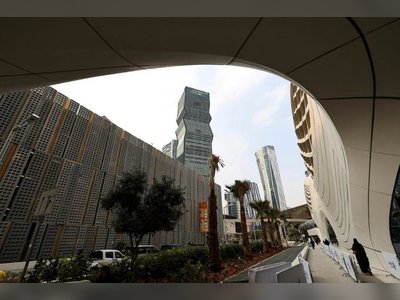0:00
0:00
Egypt's Annual Inflation Declines to 12.8% in February 2024
Consumer prices show a marked decrease, with significant changes in vegetable prices contributing to the drop.
Egypt's annual urban consumer price inflation decreased sharply to 12.8 percent in February 2024, down from 24 percent in January, according to data from the Central Agency for Public Mobilization and Statistics (CAPMAS).
The notable decline in inflation has been attributed to the base effect as the high price increases observed over the previous two years no longer impact the current inflation rate.
A survey conducted by Reuters among 15 analysts had projected a median inflation rate of 14.5 percent, indicating that the actual figure for February was substantially lower than expectations.
On a month-to-month basis, consumer prices rose by 1.4 percent in February, a slight decrease from the 1.5 percent increase noted in January.
This represents the fourth instance in the last seven months where inflation has decelerated after an escalation that began in August 2023.
Inflationary pressures last year were primarily driven by soaring fuel costs, increased public transportation fares—including for trains and the metro—and a significant 300 percent rise in the price of subsidized bread in May, marking the first such hike in over three decades.
The February slowdown was largely attributed to an 8.2 percent decline in vegetable prices, while the costs of water, electricity, and gas remained relatively stable.
In contrast, prices for grain and bread increased by 0.8 percent, meat and poultry prices rose by 3.2 percent, and fruit prices climbed by 3 percent.
Amid these fluctuations, Egypt's economic foundations exhibited positive developments.
The banking sector reported a considerable 26.9 percent increase in total deposits for the fiscal year 2023/2024, compared to the preceding 12-month period.
CAPMAS noted that total banking deposits reached 11.99 trillion Egyptian pounds (approximately $237 billion), indicating a rise in banking activity across multiple sectors.
Egypt's fiscal year runs from July 1 to June 30 of the following year.
The growth in banking deposits occurred during a period of high inflation, which peaked at 38 percent in September 2023, prompting individuals and businesses to increase their bank deposits as a hedge against potential currency devaluation.
The central bank's attractive interest rates, combined with financial inclusion initiatives as part of Egypt's Vision 2030 plan, have significantly contributed to the rise in deposits.
CAPMAS data revealed that the household sector led in banking deposits, accounting for 7.03 trillion pounds—an increase of 27.5 percent from the prior year.
Individual depositors represented 95.9 percent of household deposits, highlighting a trend of increased savings among Egyptians.
The household sector managed 58.6 percent of total banking deposits, while the business sector also showed substantial growth, with deposits rising to 1.99 trillion pounds—up 37.6 percent from the previous fiscal year.
The notable decline in inflation has been attributed to the base effect as the high price increases observed over the previous two years no longer impact the current inflation rate.
A survey conducted by Reuters among 15 analysts had projected a median inflation rate of 14.5 percent, indicating that the actual figure for February was substantially lower than expectations.
On a month-to-month basis, consumer prices rose by 1.4 percent in February, a slight decrease from the 1.5 percent increase noted in January.
This represents the fourth instance in the last seven months where inflation has decelerated after an escalation that began in August 2023.
Inflationary pressures last year were primarily driven by soaring fuel costs, increased public transportation fares—including for trains and the metro—and a significant 300 percent rise in the price of subsidized bread in May, marking the first such hike in over three decades.
The February slowdown was largely attributed to an 8.2 percent decline in vegetable prices, while the costs of water, electricity, and gas remained relatively stable.
In contrast, prices for grain and bread increased by 0.8 percent, meat and poultry prices rose by 3.2 percent, and fruit prices climbed by 3 percent.
Amid these fluctuations, Egypt's economic foundations exhibited positive developments.
The banking sector reported a considerable 26.9 percent increase in total deposits for the fiscal year 2023/2024, compared to the preceding 12-month period.
CAPMAS noted that total banking deposits reached 11.99 trillion Egyptian pounds (approximately $237 billion), indicating a rise in banking activity across multiple sectors.
Egypt's fiscal year runs from July 1 to June 30 of the following year.
The growth in banking deposits occurred during a period of high inflation, which peaked at 38 percent in September 2023, prompting individuals and businesses to increase their bank deposits as a hedge against potential currency devaluation.
The central bank's attractive interest rates, combined with financial inclusion initiatives as part of Egypt's Vision 2030 plan, have significantly contributed to the rise in deposits.
CAPMAS data revealed that the household sector led in banking deposits, accounting for 7.03 trillion pounds—an increase of 27.5 percent from the prior year.
Individual depositors represented 95.9 percent of household deposits, highlighting a trend of increased savings among Egyptians.
The household sector managed 58.6 percent of total banking deposits, while the business sector also showed substantial growth, with deposits rising to 1.99 trillion pounds—up 37.6 percent from the previous fiscal year.











